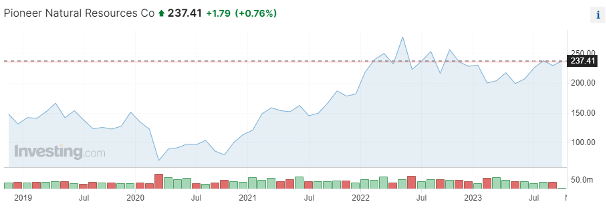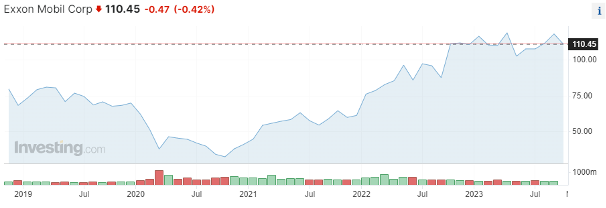In what could potentially mark the biggest acquisition of 2023, Exxon Mobil is poised to purchase Pioneer Natural Resources for a staggering $60 billion, insiders disclosed on conditions of anonymity. This strategic move would not only crown Exxon as the monarch of the largest U.S. oilfield, but it also promises a decade of inexpensive production, a boon in the ever-competitive oil and gas sector.[1]
The all-stock deal, valued at north of $250 per Pioneer share, manifests Exxon's confidence in the venture. Pioneer's stock, which closed at $237.41 this past Tuesday, has already witnessed an 11% uptick since whispers of the acquisition started circulating last week.* This transaction is set to eclipse Exxon's previous record purchase of Mobil Oil in 1998 for $81 billion and overshadows Shell's $53 billion buyout of BG Group in 2016.[2]

Pioneer Natural Resources' stock performance over the past five years. (Source: Investing.com)*
While Exxon opted to stay mum, branding the news as "market speculation," Pioneer has yet to release any official statement. If successful, this deal will consolidate much of the Permian Basin shale field, renowned for its vast oil reserves, under the stewardship of the U.S.'s oil titans. Despite potential antitrust hurdles, experts believe the acquisition will pass regulatory muster, given the duo's relatively modest footprint in the immense global oil marketplace.
This development unfolds on the heels of Exxon's remarkable financial comeback, bouncing back from substantial losses with a record $56 billion profit last year. CEO Darren Woods has weathered criticism for his unwavering commitment to fossil fuels amid escalating climate anxieties, a gamble that seems to have paid off handsomely. The company's resurgence has been fuelled by judicious cost-cutting, asset sales, and a favourable energy pricing environment in the wake of geopolitical tensions.
Pioneer Natural Resources, a key player in the U.S. shale revolution, has its own success story. It holds the bronze position in oil production in the Permian basin, boasting enviable production costs that hover around $10.50 per barrel. Pioneer's trajectory has been marked by aggressive expansion, underscored by its 2021 acquisitions of DoublePoint Energy and Parsley Energy.
Exxon's strategic acquisitions don't end there. In July, it inked a $4.9 billion all-stock transaction for Denbury Inc., a move intended to augment its burgeoning low-carbon division. Interestingly, the initial all-cash proposition was supplanted by an all-stock offer, an alteration attributed to Denbury's ballooning market value and the allure of potential Exxon stock appreciation.
Exxon's stock, recovering robustly from its early 2020 nadir of about $30, has recently celebrated an all-time high of $120 per share, a testament to the company's resilience and strategic foresight.* This proposed acquisition signals not just a reshuffling of power within the oil industry, but potentially sets the stage for the next chapter in America's energy narrative.

Exxon Mobil's stock performance over the past five years. (Source: Investing.com)*
[1,2] Forward-looking statements are based on assumptions and current expectations, which may be inaccurate, or on the current economic environment, which may change. Such statements are not guarantees of future performance. They involve risks and other uncertainties that are difficult to predict. Results may differ materially from those expressed or implied by any forward-looking statements.


